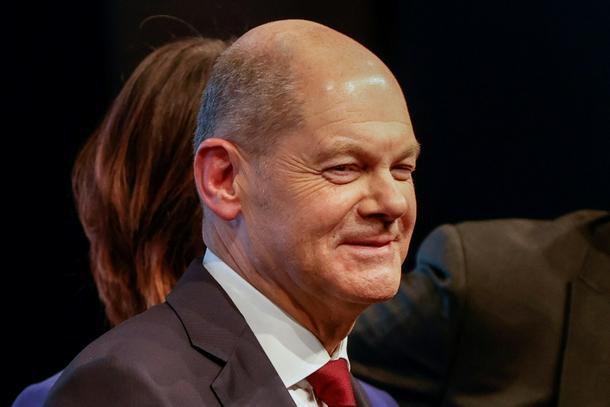
Germany's incoming chancellor Olaf Scholz, pictured on November 24, 2021, wants parliament to vote on mandatory coronavirus vaccines before the end of the year
Berlin (AFP) - Germany on Tuesday inched closer to mandatory coronavirus vaccines after incoming chancellor Olaf Scholz said they were necessary to contain a fierce fourth wave of the pandemic.
Following crisis talks with acting Chancellor Angela Merkel and the leaders of Germany’s 16 states, Scholz said he wanted parliament to vote on the matter before the end of the year.
“Too many people have not got vaccinated,” Scholz told Bild television. Making jabs compulsory is justified “to protect us all”.
Merkel’s outgoing government had always ruled out mandatory vaccination, but calls for action have grown louder in Germany as infection rates hit record highs and hospitals buckle under the strain.
Mandatory jabs are now backed by politicians from across the spectrum.
The compulsory vaccinations should be in force “in the beginning of February or March so we must move quickly now,” Scholz said, promising that lawmakers would be allowed to vote according to their conscience.
German leaders will meet again on Thursday to thrash out the details of the proposal as well as other new measures aimed at taming the Covid surge, said Merkel’s spokesman Steffen Seibert.
These include capping the number of people the unvaccinated can socialise with, closing clubs and limiting large events. Only the vaccinated and recovered would be allowed into non-essential shops, according to the plans.
Bavarian premier Markus Soeder told reporters he expected Bundesliga football games to return to playing to empty stands, following an outcry over a packed stadium in Cologne at the weekend.
“It’s clear that something needs to change when it comes to football,” Soeder said.
Several hard-hit German regions have already cancelled Christmas markets and barred the unvaccinated from public spaces like gyms and leisure facilities to slow the pandemic spread.
But critics say the patchwork of rules is confusing, and this week’s emergency talks were aimed at coming up with nationwide rules.
- Austrian example -
Germany already announced plans earlier this month to require health workers and soldiers to get inoculated against Covid-19.
Expanding that to the general public would see the country follow the example of neighbouring Austria, which is planning mandatory vaccinations from February.
Greece has announced mandatory jabs for over 60s, with unvaccinated people facing fines if they don’t comply.
Germany’s mulling of harsher restrictions comes after the constitutional court ruled that sweeping measures imposed earlier in the pandemic – including curfews, school closures and contact restrictions – were lawful.
The country recorded 45,753 new infections on Tuesday and 388 deaths, according to the Robert Koch Institute health agency.
Hospitals have long been sounding the alarm, with many already over capacity and sending patients to other parts of Germany for treatment.
In response, Europe’s biggest economy has over the last weeks began requiring people to prove they are vaccinated, have recovered from Covid-19 or have recently tested negative before they can travel on public transport or enter workplaces.
Germany’s vice-chancellor-in-waiting Robert Habeck from the Green party said more needed to be done. He urged people to reduce their contacts and said the unvaccinated should be excluded from non-essential public life.
“We will need new uniform measures to get through the winter,” Habeck said.
“This is then – it must be said so harshly – a lockdown for the unvaccinated,” he said.